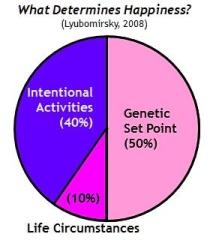
When I asked students is money a big driver of happiness many of them say yes. The pie chart developed by psychologist Sonja Lyubomirsky shows a different story. The chart shows our happiness is 50% genetic. We all have different set points which works like a thermostat. Day to day events might change your happiness for a short period but eventually you come back to your set point .(happiness scale).
Notice that life circumstances account for 10% of your happiness. If you are just married, hit the lottery or suffer a tragedy the events impact you but within a couple of years you usually fall back to your original set point. This has been backed up by a research study of the richest Americans who earn over ten million dollars a year. The millionaires reported a happiness level slightly above those who work for them.
Intentional activities are 40% of your happiness and the way to change your set point. One of those activities is gratitude. You can write three good things each day, keep a gratitude journal, write gratitude letters or call people to express gratitude. These intentional activities improve personal happiness. But why?
First, gratitude allows you to remember the positive moments. In taking joy in the some of the gifts of life you can maximize your satisfaction and enjoyment from these current events.
Secondly, gratitude improves self-esteem. When you realize what people have done for you and how much you have accomplished your confidence rises. It also drives out the negative forces that so many people have in their lives.
Expressing gratitude also helps us from comparing our lives with others. If you are thankful and appreciative for what you have, you are not going to compare yourself to others.
While it is extremely hard to express gratitude during personal adversity it might be the most important. On days that I think there was nothing to be grateful about I force myself to come up with three good things. Traumatic experiences or life events are less likely to surface on those who are regularly grateful.
There are many ways to express gratitude, some of which I mentioned above. Choose the methods that feel most comfortable to you and begin raising your happiness set point.
I confidently got a 5.48. Very Happy.
ReplyDeleteSam Vermette
that makes me happy
ReplyDeleteI got a 4.24 on this test. I feel this is very accurate. I am very happy where I am in life but not where I could be. I remember the first day of Government class and the introduction of the 3 good things. You mentioned whenever you got in an argument, you would think of every bad thing that person had ever done and it made the argument worse. I did that all the time and it really messed up some relationships I had. But the 3 good things and your anecdote really opened my eyes. It really has helped me.
ReplyDelete-- Will Cook
If you asked me the most important thing I teach you it would be three good things. Next year I am teaching a course in positive psychology which I am really psyched about because I think it can make a difference.
ReplyDeleteI got a 3.92 on the test and I think this is where I am right now since I am waiting the remainder of my schools to get back to me and having 6 AP exams on my mind at the moment.
ReplyDelete- Matthew Tao
I think determining your own happiness certainly can help you daily. Before tackling each day of life's problems and issues, finding your own happiness can definitely give you a different perspective that helps no matter what!
ReplyDelete-Travis
I got a 4.45 on my happiness test, and it seems pretty accurate to me. Despite having a pretty busy rest of the year ahead of me, I prefer to take a mind-over-matter approach, because things really only are as they seem. It was hard at times, but convincing myself that I could surpass any hurdle helped me alot.
ReplyDelete-Rishi
I completely agree with your thesis that happiness is not entirely based around monetary value but the two factors absolutely do effect one another but not as strongly as many think. I also believe that the way in which the newest generation view monetary wealth is changing as well. This can best be seen in the minimalist and downsizing movements. If you are not familiar, a very popular trend among the millennial and younger generations is to live simply in your day to day life with less possessions. This action frees up time spend working for frivolous reasons and allows you to experience more in life. This is a direct reflection of what these generations value, an experience. In past generations the american dream was a small house with a white picket fence, two cars and two kids. Today we see many families moving into mobile homes and cars to live on the road. They get married later or at all to travel in there 20's and 30's. I do believe that this change in outlook on the world is changing for the better and will hopefully create less of a desire to do and get what others have which had become more and more prevalent in our lives thru the other common millennial trope of social media.
ReplyDelete- Henry Jones
Within today's contemporary society, we are obsessed with the flashy and valuable aspects of success, i.e money. Money buys possessions that slow us short-term happiness but in the long run do not credit towards overall well-being. "More money more problems" as industry artists often equate to; having money is not related to happiness. But being grateful for the things around you can spark a feeling of joy, and enjoying every moment. Happiness is a butterfly, trying to catch it only makes it fly further- but just by letting it graze upon you, you can achieve eternal bliss.
ReplyDelete-Amondo Lemmon